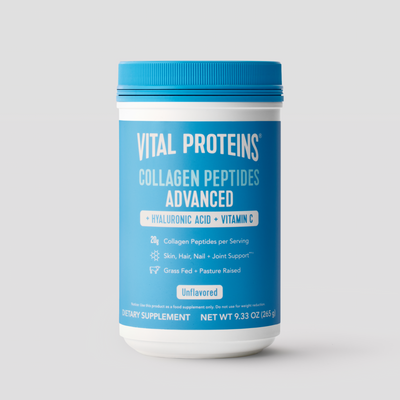When you notice a pimple on your face or that your skin lacks radiance, it's natural to blame the usual suspects, such as hormones or a hectic schedule. But if you were to listen to your gut, it's probably trying to tell you something — its health may actually play a role in your skin's issues.
"When your gut is unhealthy, this can manifest as problems with the skin," explains Selvi Vasudevan, M.D., Integrative Nutrition Health Coach focused on Crohn’s Disease. "Anything from skin rashes, itchy skin, skin allergies and acne can show up on the skin when the gut is unhealthy."
To give deeper insight into the gut-skin connection, we tapped medical experts for their insight on getting your gut health back where it needs to be for a glowing complexion.**
Vital Note: This article has been made available for informational and educational purposes only. It is not intended to be a substitute for professional medical advice, diagnosis, or treatment. Always seek the advice of your physician or another qualified health provider with any questions you may have regarding a medical condition. Your licensed healthcare professional can best provide you with the diagnosis and treatment of any medical condition and assist you as well in deciding whether a dietary supplement will be a helpful addition to your regimen.
What is the connection between skin and gut health?
"The gut has a microbiome that consists of bacteria in the intestines that affects overall health, including skin health," says Lela Lankerani, DO, Board-Certified Dermatologist at Westlake Dermatology.
When this bacterium becomes unbalanced, it's called gut dysbiosis, says Azza Halim, MD, Board-certified Anesthesiologist, Functional Medicine and Aesthetics. This can be triggered by several factors, such as food allergens, antibiotics, alcohol, certain medications and diets high in saturated fats and sugars.
While the occasional greasy French fry won't wreak too much havoc on your skin, a steady routine of triggers (such as food allergens, alcohol, and diets high in sugar and saturated fat) are likely to show up in your skin. This ranges from moderate to severe effects on your skin, including acne, rosacea, eczema and dermatitis herpetiformis.
How can you take care of the gut to prevent skin issues?

Eat a healthy, balanced diet
Radiant, glowing skin starts with your diet. An unhealthy gut allows toxins and allergens to enter the bloodstream, says Vasudevan.
So if you notice that your skin is dull, flat and lacking its usual glow, forget the quick fixes and nourish it with what it's craving instead. Make the switch from processed food, refined sugars and alcohol to whole foods, says Vasyukevich. This includes healthy fats (olive oil, salmon, mackerel, walnuts), fiber and skin-healthy foods that are rich in antioxidants (fruits and veggies).
Try a probiotic supplement
While probiotics have become a household name around the world, not everyone has a probiotic in their household. Anna Chacon, M.D. FAAD, Board-Certified Dermatologist explains why this needs to change.
"Probiotics are helpful supplements that sometimes contain good gut flora and contribute to skin health and overall health,**" she says. "Probiotics are a mixture of live bacteria and/or yeast that lives in your body."
In addition to a supplement, Lankerani says you can get probiotics from the foods you eat, such as live yogurt and fermented foods. A few options include kefir, sauerkraut and kimchi, adds Halim. Be sure to consult your doctor before choosing one, as she explains that not all nutrients or prebiotic/probiotics are created equal.
Related Articles
Get enough sleep and move your body
Improving gut health wouldn't be possible without getting enough sleep or exercising. "To improve skin health, it's important to take a functional approach: eating clean, sleeping better and exercising to minimize the stress response to help to support a healthy gut," Lankerani tells Lively.
While sleep should be around seven to eight hours, your exercise routine is more flexible. The American Heart Association (AHA) recommends 150 minutes of moderate-intensity activity each week. "Yoga, walking in nature and core exercises are a great way to start," says Vasudevan.
When to see a doctor
There are certain conditions that eating right and taking a probiotic can't fix.
"If you are having more serious Gastrointestinal (GI) issues such as GI upset, it is best to inform your primary care doctor and perhaps see a GI specialist, a gastroenterologist," recommends Chacon.
You should also speak with your doctor to help choose the right probiotic or before you adjust your diet, as Vasudevan explains that many factors go into this, such as the strains of bacteria in the probiotic and the CFU count.















